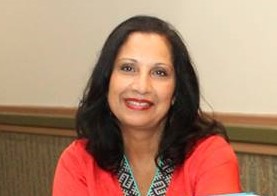I have been thrilled to have been part of the Annual Conference of the Academy of Professional Dialogue (www.aofpd.org) this whole week. Every day has been incredible with tons of learning and sharing about the promise and possibilities that dialogue brings to the world. The conference theme “The World needs Dialogue now” is such an important clarion call to all of us practitioners to step up our game, to unify and to amplify our efforts. The most fascinating day was Day 2 of course, as the Virginia Department of Corrections presented how they have embraced dialogue to create a healing environment; to bring dialogue into a state agency of corrections is totally magical and yet natural to me- private corporations cannot take their ball of the profit goal, but state agencies perhaps have more “freedom” in that sense. It is such an impressive accomplishment and one can see the dialogic culture present in every member with great passion!
I presented a paper titled “Women Weaving Peace”, which described how a group of interfaith women in Bergen County, NJ used dialogue to build deeper understanding and to develop as a community. Through dialogue, we developed deep relationships and surfaced shared values that we would all honor and practice. Indeed these values have been preached by all faiths for millennia, and as we dialogue we discover how much in common we have as human beings underneath our different faiths, flags or races. Hence the dialogue “rehumanizes” us all in each other’s mindsets and that fosters new actions, sometimes quite bold. I shared the story of one Christian woman who would bystand if a Muslim woman in hijab was being disrespected in the public; after our dialogues she became an intervener and would offer help and support.
My own experience in dialogue goes back decades, both in corporate and non-profit settings. I have been naturally drawn to this as it seems to be the simplest-and the most challenging-method of connecting human beings in being, thought and action. Ancient tribes and indigenous races practiced it in various forms. I can imagine their dialogue incorporating fewer spoken conversations and more being in relation and connecting through unspoken bonds and common values.
Even in the modern form of dialogue, especially those elucidated by David Bohm and his followers, which this Academy is committed to, it certainly enacts noble values indirectly, such as inclusion, respect, generosity, etc. These values are translated into practices, such as deep- or generous- listening, gentle or mindful speaking, suspending judgment. I particularly like David Bohm’s metaphor of “suspending judgements is like hanging out our assumptions to dry like laundry!” or some such phrase.
In my own form of dialogue, which I call Sufidialogue, we incorporate the inner work of the Sufi seeker with the outer work in the form of dialogue. The inner work helps us reconnect to our higher self, or the soul (as a believer would call it), which has been eclipsed by our selfish ego. The Selfish ego separates, competes, judges, tempts and makes us forget our interconnectedness and unity as beings. As we engage in our inner dialogue and re-examine our thoughts, our emotions, and begin to excavate the richness of learnings, we change and create a ripple effect around us which deepens the external dialogue we have. Hence the saying “you can only change yourself, not others”.
As we look around our world today with alarm at the rising hatred, violence and greed, we should not give up hope and continue to seek opportunities to rehumanize ourselves through dialogue, both inner and outer. We have lost our way, and are out on a limb as a human race. We have lost our “Insaniyet” -an Urdu and Turkish word-which means our humanity, as we clearly act inhumanly. So let’s dust off those ancient values advocated by all faiths and traditions, and rehumanize ourselves through inner and outer dialogue. Let’s be worthy of the gift of life that we got so lucky to have!

Be First to Comment